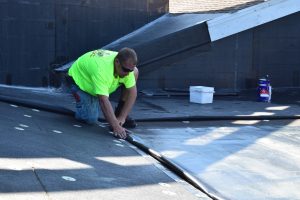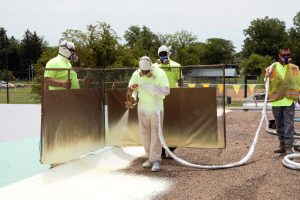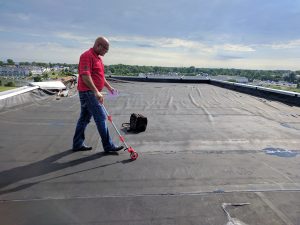As summer comes to a close, most building managers start preparing for the changing seasons and, if you are so unlucky, winter weather. But if you wait until September to prepare your roof for the winter weather, you may be too late.
Roofing contractors have very seasonal schedules, and we want to make sure your facility is in tip top shape before the end of the season. In this article, we talk about what you should consider when scheduling a roofing project.
When Should You Start Scheduling a Roofing Project?

Single-Ply Membrane EPDM Installation
The Quick Answer – The best time to schedule a roofing project is before you have a problem.
In the Northern part of the US, we have a roofing season from around April/May until October (weather permitting), while in the Southern part of the US, the roofing season can last a lot longer. The best time to contact your roofing contractor is as soon as you think you have a project.
The busiest time for roofing contractors across the US in August – October. This is because there is a push to complete projects before the end of the season and building owners finally start thinking about preparing for the change in seasons.
It’s best to work in advance, contact your roofing contractor before the season starts to secure your spot on their calendar if you wait until the end of the season – you may have to wait until next year! If you need help creating a budget, call your contractor to get budget numbers so that you can accurately propose your project to the decision maker.
Determining Factors for Scheduling a Roofing Project

SPF Installation
- Weather – Weather is one of the most critical factors that affect the scheduling of a roof project. If you have roofing material that is more temperature sensitive (such as coatings or SPF), then you may be limited by time of year. If you have extreme weather (stints of heavy rain or dangerous heat), it will delay your project.
- Material Availability – When you sign a contract for your roofing project, your contractor will order the material and supplies. If you require special materials or if your contractor doesn’t have materials on hand, then you may have to wait for them to arrive.
- Contractor Availability – If your contractor has a backlog of customers (as most do when it comes to September time) it may take a week or two for a representative to evaluate your roof. This is why it’s important to contact your contractor BEFORE you have an emergency. When the evaluation is completed, you will most likely be put in the queue for your proposal to be created.
- Crew Availability – Any contractor is limited by the number of crews that they have. As contracts are signed, crews are assigned to jobs. The later you start your project into the season, the further back you may be on a crews’ schedule. And if there is a delay in one of a crews’ jobs, it delays the rest of their jobs.
- Level of Urgency – When a contractor evaluates a facility roof and talks to the owner, they will determine how urgent a roof project is. If you have leaks and significant issues, you may be prioritized a bit higher on the list.
- Distance – How far the crew has to travel for a project can affect when it gets scheduled. If a crew has to stay in hotels nearby, that project may wait until after a holiday.
Our Commercial Roof Quote Process

Commercial Roof Inspection or Survey
Nothing in the company happens without a sale, and you can’t have a sale without a proposal. Once you are on a contractor’s schedule, the quote process can go by very quickly. It’s important to know what you should expect from a qualified roofing contractor.
Read More: Commercial Roof Quotes: Our Process
- Roof Assessment – The best way for our technical representative to determine the right roofing solution for you is to perform a roof assessment or field inspection of your facility.
- Customer Meeting – This is a crucial meeting that can help us determine what you want to see in your roof quote.
- Infrared Roof Survey – If the technical representative notices that the insulation under the membrane is wet, he may call for an infrared roof survey. Infrared Moisture Surveys give contractors the ability to see what is happening under your roof’s membrane without having to damage your roof system.
- Create and Deliver A Proposal – In the proposal, our experts will outline what is needed to rectify any issues your roof system has, a full scope of work, timeline, and quote.
- Signed Contract – During this time, there may be revisions to the proposal based on the customer’s budget or preferences. When the signed document is received, we move forward with getting your project on our schedule.
Depending on the size of your roof, and the size of your roof problem, scheduling your roof project may take some time and patience. It will make the process easier for you if you plan in advance and have clear expectations for your contractor. Don’t be afraid to ask for an expected timeline or project date ahead of time.
If you are in a pinch, we can still help! Contact our team today to schedule your roof maintenance before the end of the season!


